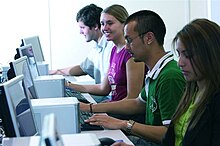This article has multiple issues. Please help improve it or discuss these issues on the talk page. (Learn how and when to remove these template messages)
|
Information and media literacy (IML) enables people to show and make informed judgments as users of information and media, as well as to become skillful creators and producers of information and media messages.[1] IML is a combination of information literacy and media literacy.[2] The transformative nature of IML includes creative works and creating new knowledge; to publish and collaborate responsibly requires ethical, cultural and social understanding.
The term "media and information literacy" is used by UNESCO[1] to differentiate the combined study from the existing study of information literacy.
Renee Hobbs suggests that "few people verify the information they find online―both adults and children tend to uncritically trust information they found from whatever source."[3]
People need to gauge the credibility of information and can do so by answering three questions:
- Who is the author?
- What is the purpose of this message?
- How was this message constructed?

Students in computer lab[4]
Prior to the 1990s, the primary focus of information literacy was research skills.[5] Media literacy, a study that emerged around the 1970s, traditionally focuses on the analysis and the delivery of information through various forms of media.[6] These days, the study of information literacy has been extended to include the study of media literacy in many countries like the UK,[7] Australia and New Zealand.[8] It is also referred to as information and communication technologies (ICT) in the United States.[9][10] Educators such as Gregory Ulmer have also defined the field as electracy.
- ^ a b "Media and Information Literacy". Portal.unesco.org. Archived from the original on 2005-11-10. Retrieved 2013-07-28.
- ^ [1] Archived February 4, 2010, at the Wayback Machine
- ^ "Media and Information Literacy in the Digital Age". www.ebsco.com. Retrieved 2023-08-20.
- ^ Office, University of Salford Press (2009-10-19), What has the Internet ever done for us?, retrieved 2022-06-13
- ^ "Information Literacy - WikEd". Archived from the original on April 22, 2009. Retrieved July 16, 2009.
- ^ "About CML | Center for Media Literacy". Medialit.org. Archived from the original on 2010-08-25. Retrieved 2013-07-28.
- ^ [2] Archived July 30, 2010, at the Wayback Machine
- ^ "Australian and New Zealand Information Literacy Framework" (PDF). Australian and New Zealand Institute for Information Literacy. Archived from the original (PDF) on 2009-05-30. Retrieved 2009-07-16.
- ^ "Definitions". InformationLiteracy (InfoLit). Retrieved 2023-03-07.
- ^ O'Connor, Barbara, et. al. (May 2002). Digital Transformation: A Framework for ICT Literacy. ICT Literacy Panel. http://www.ets.org/Media/Research/pdf/ICTREPORT.pdf
